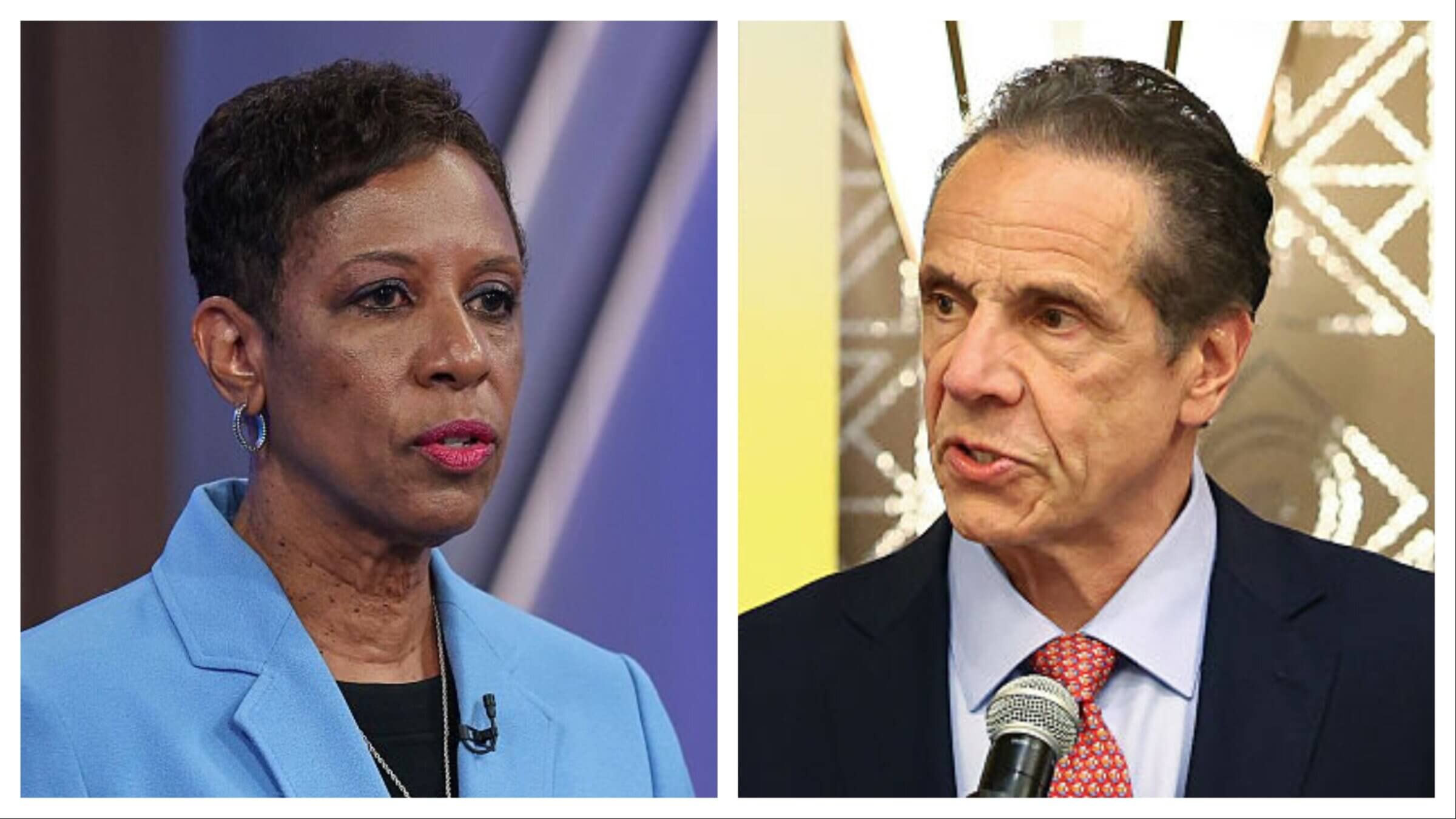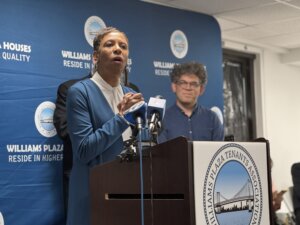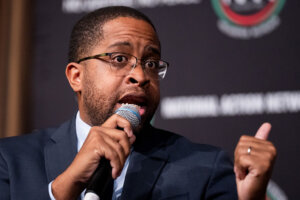How Adrienne Adams got the coveted Hasidic nod Andrew Cuomo longed for
The Council Speaker locked down a critical bloc of Orthodox Jewish votes, potentially reshaping the mayoral primary

NYC mayoral candidates Adrienne Adams and Andrew Cuomo. Photo by Yuki Iwamura-Pool/Getty Images and Michael M. Santiago/Getty Images
City Council Speaker Adrienne Adams has secured more than two dozen coveted Hasidic endorsements, making her the dark horse to watch in what has been a tumultuous mayoral race.
Late on Monday, Speaker Adams received the backing of 25 Hasidic sects and schools in Borough Park, part of an influential voting bloc that helped swing the 2021 mayoral race for incumbent Eric Adams. The two Adamses are not related.
The twist: the endorsements for Adrienne Adams ahead of the June 24 Democratic primary appear to be part of a strategy to help the embattled mayor, who has quit the Democrats and is running in the general election on an independent “End Antisemitism” line.
The speaker’s announcement is a setback for former Gov. Andrew Cuomo, the front-runner who had been actively courting Hasidic support and hoped to consolidate the Orthodox groups behind his candidacy.
Orthodox voters favor Mayor Adams, but his status as an Independent has led the leadership to explore an array of candidates in the primary.
The endorsements come at a critical moment in the mayoral race. Recent polls show a close race between Cuomo and Zohran Mamdani, a Democratic Socialist and a vocal critic of Israel who identifies as anti-Zionist.
Cuomo, who has made fighting antisemitism central to his candidacy, leads with 41% among Orthodox voters in the primary, according to a recent survey, and secured the backing of the largest Hasidic sects, the two Satmar sects in Williamsburg and Bobov in Boro Park. However, he failed in his bid to secure the unified front he was counting on to stop Mamdani’s insurgency.
Even among Cuomo’s Hasidic supporters, there are signs that the endorsements are not rock solid.
Moshe Indig, the political leader of the Satmar sect led by Rabbi Aaron Teitelbaum, told The New York Times he may add Mamdani to his slate of endorsements. Ultimately, he said, he wants to see Mayor Adams re-elected with Orthodox support.
Two leaders involved in the outreach effort, who requested anonymity to speak freely about internal discussions, said that Cuomo met with just a handful of Hasidic leaders and neglected deeper outreach to the broader network of schools and administrators who manage turnout operations.
In these private meetings, and in carefully crafted interviews with online publications, Cuomo reportedly “expressed deep regret” for singling out Hasidic communities for enforcement during the COVID-19 pandemic.
One longtime Hasidic operative predicted that at least 20% of voters who belong to the groups who endorsed Cuomo are “soft votes” open to persuasion.
New York City’s 700,000 Jewish adults, who have made up about 16% of the Democratic primary vote in past elections, could comprise as much as 20% of turnout in the primary because of growing concern over antisemitism and expected lower turnout citywide.
Adrienne Adams’ path

 All eight primary candidates have invested in outreach to Orthodox leaders or voting groups in recent months. Among those soliciting Orthodox support were Mamdani, Brad Lander and Scott Stringer — who are both Jewish — and State Sen. Zellnor Myrie, who represents the heavily Jewish Brooklyn neighborhoods of Crown Heights, East Flatbush and Park Slope.
All eight primary candidates have invested in outreach to Orthodox leaders or voting groups in recent months. Among those soliciting Orthodox support were Mamdani, Brad Lander and Scott Stringer — who are both Jewish — and State Sen. Zellnor Myrie, who represents the heavily Jewish Brooklyn neighborhoods of Crown Heights, East Flatbush and Park Slope.
Whitney Tilson, a hedge fund investor who is married to a Jewish woman, targeted Mamdani over his Israel stance, and Michael Blake walked back his accusation that Israel’s conduct in the Gaza war amounted to genocide.
Adrienne Adams, by contrast, kept much of her outreach behind closed doors. Her pitch centered on trust-building and policy commitments, particularly related to funding for Orthodox education.
The powerful Satmar Ahronim sect in Williamsburg endorsed Cuomo as its top primary choice, but slotted Adams second. The sect joined the “Borough Park United” coalition in ranking the speaker as number one.
The endorsement, expected to run as a full-page ad in Yiddish-language weeklies ahead of the primary, praises the council speaker’s “golden career of exceptional sympathy” and her role in forging “very positive relations” that benefited the community.
“In today’s tense times it is crucially important to have strong sympathetic representation in government so that we can continue with our religious way of life,” it says.
Adams told the Forward on Tuesday that she connected with the school administrators through her passion for education. “Our hearts have met,” she said.
She also received the backing of three Hasidic tenant leaders, who represent a large constituency in public housing in Williamsburg.
“I don’t know anything about Andrew Cuomo’s base,” she said when asked about Cuomo’s confidence that he would secure the Hasidic vote. “I know about Speaker Adrienne Adams’ work.”
Adams, in her campaign, has honed in on specific Orthodox asks.
At a mayoral forum on Jewish issues, co-hosted by the liberal New York Jewish Agenda, Adams strongly defended Hasidic yeshivas under scrutiny in recent years for failing to meet state education standards.
At a UJA-Federation town hall last month, Adams pledged to create a deputy mayor for Jewish affairs and antisemitism, a first-of-its-kind role. In a televised debate, she vowed to make Israel her first international trip as mayor, calling it “the Holy Land.”
Adams said she would oppose removing government funding, including security grants and childcare subsidies, from any schools, compliant or not with state regulations.
“We need to be resourcing them, not taking resources from the children,” she said. “There has to be a way that the local government can work with the state government to work through this and not have the children suffer in between.”
The mayor’s office reportedly was key to the speaker getting the Hasidic endorsements, despite growing tension between the two Adamses.
According to The New York Times, an aide to the mayor encouraged Orthodox leaders to endorse anyone but Cuomo in hopes of biting into his support ahead of a more competitive general election contest.
The November election could include at least five candidates — the incumbent mayor; Curtis Sliwa, the Republican nominee; Jim Walden, a former federal prosecutor; Mamdani on the Working Families Party or as the Democratic nominee; and Cuomo either as the Democratic nominee or running on a newly-created ballot line.
In a weekly news conference at City Hall, Mayor Adams said Cuomo was overstating his support in the Orthodox community
“He’ll go and identify one or two people in a community and say, ‘I have the community,’” he said. “You’re going to see some things in this race that we’ve never seen before… So, you know, let the primary run its course. We are going to see what’s going to happen in the general.”
The other candidate getting Orthodox support

Myrie directly appealed to Orthodox voters by focusing on affordable housing, taxes, education and public safety.
Myrie, polling in the single digits, scored second place in the ranked choice slate recommended by Hasidic groups in Borough Park and third place on the slate posted by a coalition of sects in Williamsburg.
Myrie offered detailed plans. He prioritized the rezoning of empty lots allocated for industrial use to ease the housing burden in neighborhoods with growing Orthodox populations. He also proposed overhauling the property tax system, restoring NYPD staffing levels to a 2018 peak and expanding the state curriculum to include education on Jewish history.
In a memo sent to six leaders representing the Hasidic community, Myrie said that the issues are ones that “community leaders have brought to my attention.” He pledged to continue “to work together to ensure that the Hasidic community always feels safe, welcome and supported in our city.”
In a statement on Tuesday, Myrie said he was “tremendously grateful” to earn the support of community organizations and institutions. “With rising antisemitism and threats to the community, I am proud to stand with this community and will continue to do so in City Hall,” he said.














